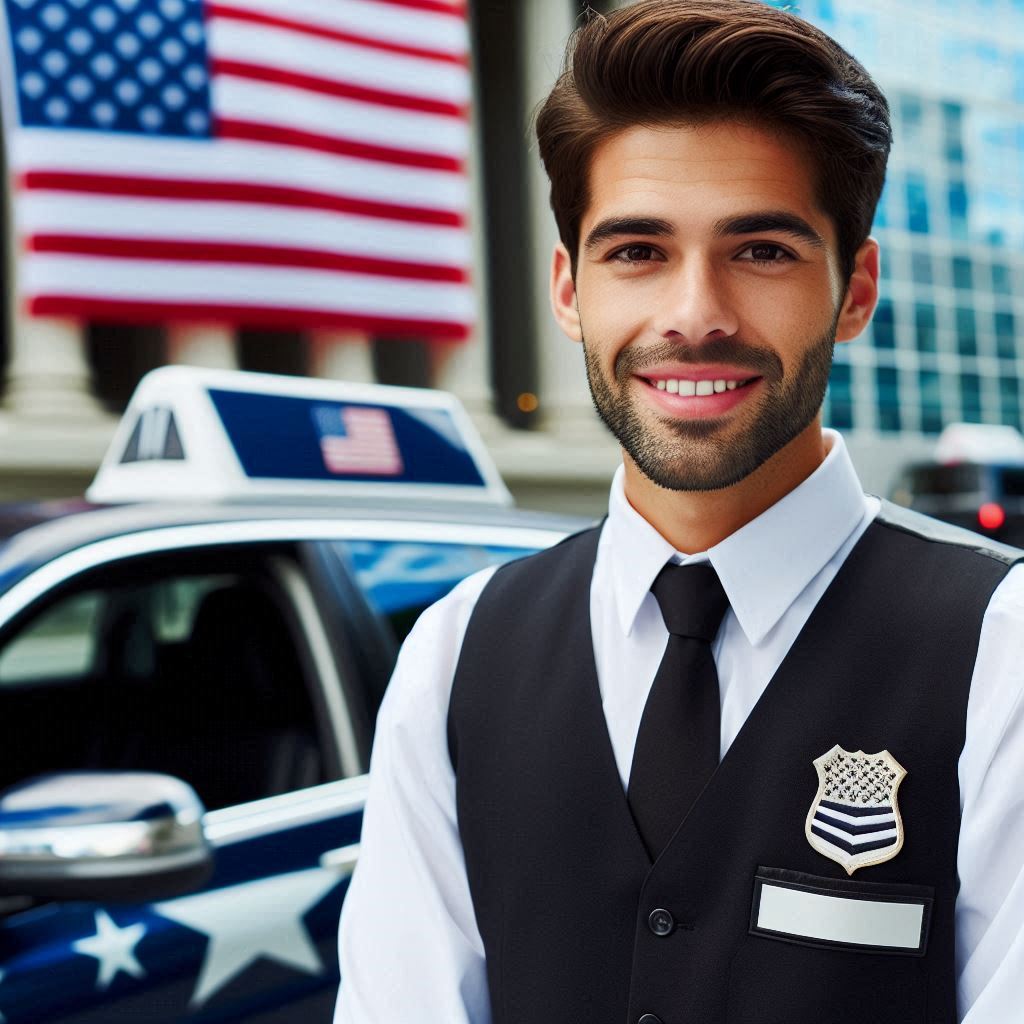Introduction
A chauffeur is a professional driver who transports clients safely and comfortably.
Chauffeurs often work for private individuals, companies, or limousine services, providing exceptional customer service while ensuring a smooth travel experience.
They must navigate through busy traffic, manage schedules, and maintain a high level of professionalism.
Licenses and certifications play a crucial role in this profession.
They demonstrate a chauffeur‘s skills and knowledge of local traffic laws.
Most jurisdictions require a valid driver‘s license and a clean driving record.
A standard driver’s license may suffice in some areas, while others mandate specialized chauffeur licenses that require additional training.
These licenses ensure that drivers adhere to higher safety and professionalism standards.
Beyond the basic licensing requirements, various certifications can enhance a chauffeur‘s credentials.
Courses in defensive driving or advanced vehicle operation showcase a driver‘s commitment to safety and customer satisfaction.
These certifications not only improve a chauffeur‘s skill set but also boost their job prospects in a competitive market.
Furthermore, many clients seek chauffeurs with certifications in first aid and CPR, adding an extra layer of assurance during travel.
Companies often prioritize hiring certified chauffeurs, knowing they have met industry standards.
Overview of Chauffeur Job Requirements
To work as a chauffeur, individuals must meet specific job requirements that ensure they are qualified to transport passengers safely and professionally.
These requirements may vary depending on location and the type of service provided.
This overview outlines the essential licenses, certifications, and regulations required to become a chauffeur.
It highlights their importance in ensuring safety and professionalism in the industry.
Different types of licenses and certifications needed
- Driver’s License: The most basic requirement for becoming a chauffeur is a valid driver’s license.
This license allows individuals to operate a vehicle legally on public roads.
It verifies that the driver has passed the necessary tests to ensure a basic level of competence in vehicle operation. - Commercial Driver’s License (CDL):In some states and countries, chauffeurs must obtain a Commercial Driver’s License to transport passengers for hire.
This license shows that the individual has passed extra tests and training for commercial driving.
It ensures they can handle larger vehicles and various driving conditions. - Chauffeur License: Certain jurisdictions require chauffeurs to obtain a specialized chauffeur license in addition to a regular driver’s license.
This license may involve extra testing related to passenger safety, vehicle operation, and customer service.
It signifies that the chauffeur has undergone specific training to address the unique responsibilities that come with transporting passengers. - Transportation Network Company (TNC) Certification: Chauffeurs working for ride-sharing companies like Uber or Lyft may need to obtain TNC certification.
This certification demonstrates that the individual has met the company’s requirements for driving and customer service.
It typically involves background checks, vehicle inspections, and adherence to the company’s operational guidelines.
Regulations set by different states and countries
- Vehicle Inspections: Many states and countries require chauffeurs to have their vehicles inspected regularly to ensure they are safe for passenger transport.
These inspections cover various aspects, including mechanical systems, safety features, and overall cleanliness.
Regular inspections help maintain the integrity of the vehicle and ensure a comfortable and safe experience for passengers. - Background Checks: Chauffeurs must undergo background checks.
These checks confirm they have a clean driving record and also ensure chauffeurs have no disqualifying criminal history.
These checks help protect the safety of passengers and instill trust in the service provided.
A clean background is crucial, as passengers need to feel secure while being transported. - Insurance Requirements: Chauffeurs may need to have specific insurance coverage to protect passengers in the event of an accident.
This insurance typically includes liability coverage, medical payments coverage, and uninsured/underinsured motorist coverage.
Having adequate insurance is not only a legal requirement in many jurisdictions but also provides peace of mind for both the chauffeur and the passengers. - Drug and Alcohol Testing: Some states and countries require chauffeurs to undergo drug and alcohol testing to ensure they are not impaired while on duty.
These tests help maintain the safety of passengers and other road users.
Regular testing helps promote a responsible driving culture and ensures that chauffeurs are fit for duty at all times.
Overall, the licenses and certifications required to work as a chauffeur are designed to ensure the safety and professionalism of drivers who transport passengers for hire.
By meeting these requirements, chauffeurs can provide a secure and reliable service to their passengers while complying with the regulations of their jurisdiction.
Adhering to these standards not only safeguards passenger safety but also upholds the reputation of the transportation industry.
Read: Understanding Nail Disorders: A Technician‘s Guide
Types of Licenses Needed for Chauffeur Jobs
Chauffeur jobs require specific licenses to ensure safety and compliance with regulations.
Understanding the necessary licenses is essential for anyone considering a career in this field.
Commercial Driver’s License (CDL)
A Commercial Driver’s License (CDL) is often a requirement for chauffeurs.
This license allows drivers to operate commercial vehicles, including buses and large vans.
Obtaining a CDL involves passing a series of tests.
These tests assess both knowledge and driving skills.
Each state has its own CDL requirements, so candidates must check local regulations.
To get a CDL, drivers must first obtain a learner‘s permit.
This permit allows new drivers to practice under supervision.
After a designated practice period, candidates can take the road skills test.
Successful completion of this test earns them a full CDL.
Additionally, certain employers may prefer or require a specific class of CDL, depending on the vehicles they operate.
Class E License
In many states, chauffeurs must also obtain a Class E License.
This license permits drivers to operate small commercial vehicles for hire.
Unlike the CDL, a Class E License is generally easier to obtain.
Requirements vary by state, so drivers should confirm local rules.
Candidates for a Class E License typically undergo written and driving tests.
The tests evaluate the driver’s understanding of traffic laws and their ability to operate a vehicle safely.
This license is suitable for chauffeurs who drive cars, minivans, or small buses.
Additionally, a Class E License often allows for transporting passengers.
This makes it ideal for limousine drivers, taxi drivers, and other transportation services.
Passenger Endorsement
Some chauffeurs may need a Passenger Endorsement in addition to their primary license.
This endorsement allows drivers to transport more than a specified number of passengers.
Usually, this requirement applies to vehicles designed to carry 16 or more passengers.
To obtain a Passenger Endorsement, drivers must meet specific criteria.
This typically includes a background check and a medical examination.
The medical exam ensures drivers are fit to operate a vehicle safely.
Drivers must also pass additional written and driving tests to obtain the endorsement.
This process verifies that chauffeurs understand the special considerations involved in transporting passengers.
In summary, aspiring chauffeurs should be aware of the licenses and endorsements required for their roles.
Obtaining a Commercial Driver’s License (CDL) is crucial for operating larger vehicles.
A Class E License is suitable for smaller commercial vehicles, while a Passenger Endorsement allows for transporting multiple passengers.
Each of these licenses requires meeting specific state requirements, ensuring drivers are equipped to provide safe and reliable transportation services.
Read: How to Deal with Pet Grooming Allergies
Requirements for getting a CDL
Age and residency requirements
To start your journey toward a Commercial Driver’s License (CDL), first understand the age and residency requirements.
Check the rules set by your state’s Department of Motor Vehicles (DMV) or equivalent authority.
Age Requirements
- Intrastate Travel: You must be at least 18 years old to drive a commercial vehicle within the same state.
This means you can operate a commercial vehicle without crossing state lines, which is often a stepping stone for many aspiring commercial drivers. - Interstate Travel: If you wish to drive across state lines, you need to be at least 21 years old.
This age restriction is in place due to the increased responsibility and regulations associated with operating a commercial vehicle that travels between states.
Residency Requirements
In addition to age, you must provide proof of residency in the state where you are applying for your CDL.
This can typically be established through documents such as a utility bill, lease agreement, or bank statement that clearly shows your name and current address.
Each state may have specific documentation requirements, so it‘s advisable to check with your local DMV for details.
Written and skills test
Once you meet the age and residency criteria, the next step is to prepare for and pass the necessary tests required to obtain your CDL.
Written Knowledge Test
You will need to successfully complete a written knowledge test that covers essential rules and regulations of commercial driving.
This test assesses your understanding of traffic laws, safe driving practices, and the specific regulations governing commercial vehicles.
Topics may include:
- Vehicle operation and safety
- Hazardous materials handling
- Air brakes and combination vehicles (if applicable)
To ensure you are well-prepared, many states offer practice tests and study materials that simulate the actual exam.
Utilizing these resources can significantly improve your chances of passing the written test on your first attempt.
Skills Test
After passing the written knowledge test, you will move on to the skills test.
This practical assessment evaluates your ability to operate a commercial vehicle safely and effectively.
The skills test typically consists of two main components:
- Pre-Trip Inspection: You will demonstrate your ability to conduct a thorough inspection of the vehicle, ensuring that it is safe and ready for operation.
- Road Test: You will then take the vehicle on the road, showcasing your driving skills in various scenarios, including turning, stopping, and navigating traffic.
Preparation for the skills test may involve practicing with a licensed instructor or a qualified CDL training program to gain the necessary hands-on experience.
Medical examination
Another crucial step in the CDL application process is the medical examination.
This examination ensures that you are physically capable of driving a commercial vehicle without endangering yourself or others on the road.
What the Examination Entails
During the medical examination, a certified medical examiner will assess various aspects of your health, including:
- Vision: Your eyesight must meet specific standards to ensure safe driving.
- Hearing: You must be able to hear and respond to sounds such as horns and sirens.
- Blood Pressure: High blood pressure may require further evaluation and monitoring.
- Overall Health: The examiner will evaluate your general health, including any chronic conditions that could affect your ability to drive.
Medical Disqualifications
It‘s important to note that certain medical conditions may disqualify you from obtaining a CDL.
These may include, but are not limited to:
- Severe vision impairment
- Certain cardiovascular issues
- Substance abuse problems
If you have a medical condition, it is advisable to consult with your healthcare provider and the medical examiner ahead of time to discuss your eligibility.
Transform Your Career Today
Unlock a personalized career strategy that drives real results. Get tailored advice and a roadmap designed just for you.
Start NowMeeting the requirements for obtaining a Commercial Driver’s License (CDL) is essential for anyone aspiring to become a licensed chauffeur or commercial driver.
By thoroughly understanding and fulfilling these requirements, you can ensure that you are qualified to operate a commercial vehicle safely and responsibly.
Obtaining a CDL not only opens up numerous opportunities for employment in various industries that require skilled drivers but also positions you for a rewarding career.
Ensure you follow all necessary steps and meet the qualifications to embark on a successful journey as a commercial driver.
By investing time and effort into this process, you will be well on your way to achieving your CDL and securing a promising future in the transportation industry.
Read: How to Deal with Pet Grooming Allergies

Importance of a Clean Driving Record
A clean driving record is crucial for chauffeurs.
It reflects their commitment to safe driving practices.
Employers seek drivers who prioritize safety and professionalism.
A clean record builds trust with clients and employers alike.
It shows reliability, a vital trait for anyone in this role.
Additionally, a spotless record often leads to better job opportunities.
Companies are more likely to hire chauffeurs with no history of accidents or violations.
Traffic violations and accidents
Traffic violations can severely impact a chauffeur‘s career.
Even minor infractions may raise red flags for potential employers.
Serious violations, like DUIs or reckless driving, can be disqualifying.
A history of accidents signals poor driving skills, which can deter clients.
Chauffeurs must understand the importance of adhering to traffic laws.
Following speed limits and avoiding distracted driving is essential.
Each violation can lead to increased insurance premiums for drivers.
Higher premiums may discourage employers from hiring or retaining chauffeurs.
Chauffeurs should regularly review their driving records for any discrepancies.
Maintaining awareness helps them address issues proactively.
If they notice violations, they can take corrective action, such as attending traffic school.
Completing traffic courses can sometimes remove points from a record.
It demonstrates their willingness to improve and adhere to regulations.
Employers appreciate candidates who take responsibility for their driving behavior.
Background checks
Background checks are standard in the chauffeur hiring process.
Employers conduct these checks to ensure driver reliability and safety.
They often include a review of driving records and criminal histories.
A thorough background check helps companies avoid hiring individuals with questionable backgrounds.
Chauffeurs must be prepared to provide necessary documentation during this process.
A clean record enhances their chances of passing these checks.
Employers want to ensure that their chauffeurs will not pose a risk to clients.
They also want to protect their company‘s reputation.
A negative background check can disqualify a candidate, even with excellent driving skills.
Chauffeurs should understand the impact of their past on their future employment.
Maintaining a clean record demonstrates responsibility and accountability.
Basically, a clean driving record is vital for a chauffeur‘s success.
Traffic violations and accidents can hinder job prospects.
Background checks further emphasize the need for reliability and professionalism.
Prospective chauffeurs must prioritize safe driving and maintain their records.
This approach will lead to better job opportunities and a successful career in this field.
Read: How to Create a Pet-Friendly Grooming Environment
Additional Certifications for Chauffeurs
Defensive driving certification
A defensive driving certification is an invaluable asset for chauffeurs, providing them with essential skills to anticipate and avoid potential hazards on the road.
This certification offers comprehensive training that equips chauffeurs with techniques to identify risks early and implement strategies to mitigate them.
By learning to remain vigilant and proactive, chauffeurs can better protect themselves, their passengers, and others on the road.
Defensive driving courses teach chauffeurs about various driving scenarios.
They learn to handle adverse weather conditions and heavy traffic.
They also prepare for unpredictable behaviors from other drivers.
The training emphasizes the importance of maintaining a safe following distance, utilizing mirrors effectively, and understanding the dynamics of different vehicle types.
Additionally, chauffeurs learn how to react quickly and safely in emergency situations, such as sudden stops or the need to maneuver around obstacles.
This knowledge is crucial for reducing the risk of accidents and enhancing overall road safety.
Chauffeurs who obtain a defensive driving certification often find themselves more competitive in the job market.
Many reputable companies prioritize hiring drivers who have demonstrated a commitment to safety through this certification.
Consequently, these chauffeurs may command higher pay due to their advanced skills and qualifications.
The certification serves as a testament to a chauffeur’s dedication to maintaining a safe driving environment, making them more desirable to clients who prioritize safety.
Moreover, clients feel a greater sense of security when they know their chauffeur has undergone defensive driving training.
The peace of mind that comes from knowing a driver is skilled in hazard recognition and accident prevention is invaluable.
This trust fosters long-term relationships between chauffeurs and clients, leading to repeat business and positive referrals.
First aid and CPR training
In addition to defensive driving, first aid and CPR training are crucial certifications for chauffeurs.
Emergencies can arise unexpectedly, and having immediate medical assistance available can significantly impact the outcome of critical situations.
Chauffeurs with these certifications are prepared to respond effectively when faced with injuries or sudden illnesses.
First aid training equips chauffeurs with the knowledge and skills to assess an emergency situation and provide appropriate care.
They learn how to perform CPR, control bleeding, manage shock, and handle other medical emergencies until professional help arrives.
This training not only builds confidence but also ensures that chauffeurs can act decisively and calmly in high-pressure scenarios.
Having first aid and CPR training is not just a matter of professional development; it directly influences the safety and well-being of clients.
Passengers are more likely to feel secure knowing that their chauffeur is equipped to handle medical emergencies.
This assurance can enhance the overall experience, as clients can relax and focus on their journey rather than worry about potential risks.
Furthermore, the combination of defensive driving and first aid training sets chauffeurs apart from their peers.
These additional certifications signify a strong commitment to safety, professionalism, and exceptional service qualities that are highly valued in the chauffeur industry.
Obtaining certifications such as defensive driving, first aid, and CPR training can significantly enhance a chauffeur’s career prospects.
These credentials show a commitment to safety and professionalism.
They equip chauffeurs with skills to navigate challenging driving conditions and respond to emergencies.
In a competitive job market, these qualifications significantly impact chauffeurs.
They position chauffeurs as trusted professionals focused on their clients’ safety and well-being.
By investing in these certifications, chauffeurs can elevate their careers, foster client trust, and contribute to a safer driving environment.
Discover More: The Most Common Reasons to Call a Locksmith
Benefits of Obtaining Licenses and Certifications
Obtaining licenses and certifications can significantly enhance a chauffeur‘s career prospects.
These credentials serve as proof of a chauffeur’s skills and professionalism.
They provide a competitive edge in a crowded job market.
More job opportunities
Chauffeurs with licenses and certifications can access a wider range of job opportunities.
Many companies require specific licenses to ensure driver safety and compliance with local laws.
Having these qualifications makes a chauffeur more appealing to employers.
Licensing often involves passing background checks and drug tests.
These steps ensure the chauffeur meets safety and regulatory standards.
Many high-end transportation companies prioritize hiring certified chauffeurs.
They prefer drivers who have completed professional training programs.
This preference increases your chances of securing a position.
Additionally, some employers only hire chauffeurs with specialized certifications.
For instance, certifications in defensive driving or first aid can make a candidate stand out.
These additional qualifications show commitment to the profession and client safety.
In regions where ride-sharing services operate, licensed chauffeurs can also find work.
Companies like Uber and Lyft often favor drivers with commercial licenses.
This preference creates more opportunities for certified chauffeurs to earn extra income.
Higher salary potential
Licenses and certifications can also lead to higher salary potential.
Employers often offer competitive wages to qualified chauffeurs.
These wages reflect the expertise and reliability that licensed drivers provide.
Statistics show that certified chauffeurs tend to earn more than their non-certified counterparts.
This wage difference can be significant over time.
Many clients are willing to pay more for experienced and certified chauffeurs.
They value the assurance of safety and professionalism.
Moreover, certified chauffeurs can negotiate better salaries.
They have evidence of their qualifications, which strengthens their bargaining position.
Many employers recognize the financial benefits of hiring certified chauffeurs.
They understand that these professionals can enhance the company‘s reputation and client satisfaction.
In addition, some chauffeur roles offer bonuses or incentives for licensed drivers.
Companies may reward certifications that align with specific company goals.
This financial incentive further increases the overall earning potential for certified chauffeurs.
All in all, obtaining licenses and certifications provides numerous benefits for chauffeurs.
These credentials expand job opportunities and lead to higher salary potential.
A commitment to professional development enhances your career and attracts more clients.
By investing in licenses and certifications, you invest in your future as a successful chauffeur.
Conclusion
Licenses and certifications play a crucial role in chauffeur jobs.
They ensure safety and professionalism on the road.
Without the proper credentials, aspiring chauffeurs may struggle to find employment.
Employers often prioritize candidates with valid licenses and relevant certifications.
These credentials enhance your credibility and marketability in a competitive field.
Understanding the requirements in your area is essential for aspiring chauffeurs.
Each region may have specific licensing regulations, including background checks and training programs.
Research local regulations to identify necessary licenses and certifications, such as a commercial driver’s license (CDL) or passenger endorsement.
Pursuing these qualifications will boost your career prospects and client trust.
Investing time and effort in fulfilling these requirements pays off significantly.
Obtaining the necessary licenses and certifications can open doors to more job opportunities and higher-paying positions.
You’ll stand out as a competent and reliable chauffeur in a crowded market.
Embrace the journey toward becoming a licensed professional.
Your dedication will lead to success in this rewarding profession.
Taking these steps will set you apart and help you thrive in your chauffeur career.




